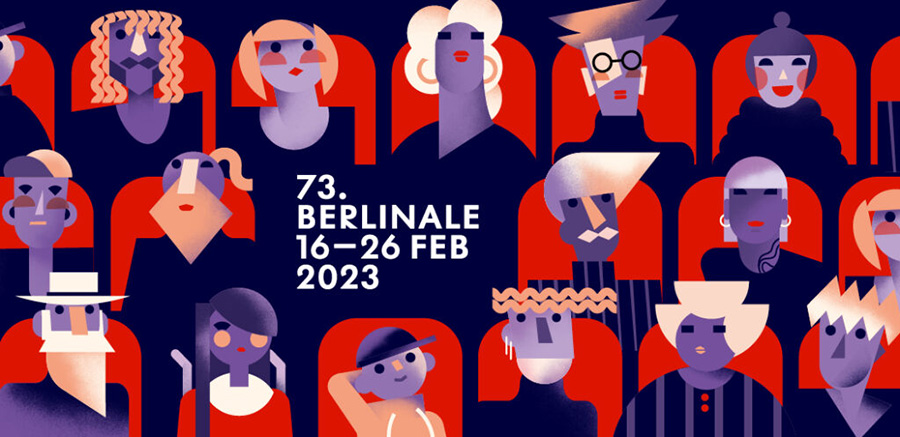
Berlinale 2023
Publié par Birgit Beumers - 5 mars 2023
Catégorie(s): Cinéma, Expositions / Festivals
The Berlinale Competition. Maskless, Faceless, Genderless
This year’s Berlinale was the first full-blown event since February 2020, the “last” international film festival to take place before the pandemic. In 2021, the festival went online, and last year’s edition took place with restrictions — chessboard seating, regular testing, and travel limitations — stopping many international visitors from attending, and missing the important buzz of the European Film Market (EFM), which was held online. So, expectations were high for the 2023 edition, especially for ticket sales and market attendance. And all these expectations were met, even exceeding pre-pandemic levels.
However, on other levels, expectations were somewhat frustrated, particularly concerning the selection for the competition, on which we focus here. This year’s Berlinale competition included three debuts, two animation films (Suzume by Makoto Shinkai, Japan; and the late addition, Art College 1994 by Liu Jian, China), and one documentary. From an array of films, the only documentary film was awarded the main prize, which speaks of a victory of the documentary form on the one hand, but might on the other hand signal a decision shunning away from a full engagement with rather mediocre feature films. This mediocrity was also reflected in the Screen jury grid, which had most films rated with a similar average of around 2.5/4, and only two stand-out titles with averages above 3, Celine Song’s Past Lives and Christian Petzold’s Afire, both discussed below.
But let’s start with the debuts, maybe the most promising category in any festival. Following the footsteps of Carla Simón’s Alcarràs, which won the Golden Bear in 2022, comes the film 20,000 Species of Bees (20.000 especies de abejas) by Estibaliz Urresola Solaguren. This amazing debut won the viewer, and the jury, with the outstanding performance of the 8-year-old Sofía Otero, who garnered the Best Lead Performance award (in the now genderless nomination replacing Best Actor/Best Actress). The film tells the story of the youngest son, Aitor by birthname and nicknamed ‘Coco’, in a family where mother and father are experiencing a marital crisis. During the summer vacation, Coco’s mother tries to re-establish herself as a sculptor and connect to the legacy of her late father while she and the children stay in the parental home in the Basque country. Coco, meanwhile, wishes to be seen as a girl and to be addressed as Lucy. As the child quietly and calmly tries to assert her new sexual identity, the film focuses on the reaction of the world around Coco: the eccentric aunt Lourdes, a beekeeper, who cures illnesses with her bees, easily bonds with Coco through a story about the social life of the bees. Lourdes is much more understanding than the conformist and traditionalist grandmother, who is governed by conventions and norms that she has internalised, laying the blame for Coco’s doubts at her daughter’s feet. The film also shows how three generations of women (grandmother and aunt, mother, child) interact with each other, mostly in the absence of men. Solaguren and her cinematographer Gina Ferrer Garcia offer a vision that shows with extraordinary sensitivity how the surrounding world defines “normality” and how people create those ‘mind-forged manacles’ (William Blake). As the Berlinale has changed awards to genderless nominations, Otero was awarded for the Best Lead Performance. One wonders, though, what the toll may be for the psyche of an 8-year-old to take this heavy prize at an international festival.
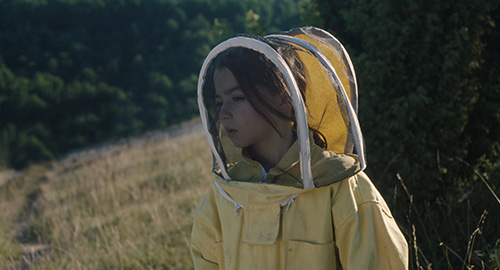
© Gariza Films, Inicia Films
Another debut film in the competition was Disco Boy (France, Italy, Belgium, Poland) by French-based Italian director Giacomo Abbruzzese, well known for his documentary America (2022). The film grips the viewer with a stunning performance of Franz Rogowski as Belarusian fugitive Alexei, who ends up in France without papers and joins the French foreign legion. He is dispatched to Nigeria to free French hostages held by MEND (Movement for the Emancipation of the Niger Delta). After completing his mission with heavy gunfire and losses, he is haunted by the sister of MEND’s leader. Although the director plays with a range of narrative threads (the stateless Alexei, the emancipation of Nigerians, the French legion), these are overall not always woven into a smooth texture. Impressive is the cinematography by Hélène Louvart, who captures the often hallucinatory, dream-like visions with extraordinary visual clarity.
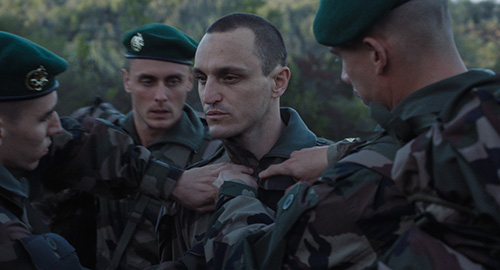
© Films Grand Huit
The third debut film came to Berlin from Sundance and hit the Screen rating right at the top: Past Lives by Celine Song. With an almost ironic distance, Song tells the story of the Korean girl Nora, whose family immigrates to Canada when she is twelve years old. She leaves behind her best school friend, Hae Sung, on whom she has a crush. Twelve years later, Nora has found her way in life and is studying in New York to be a playwright. During a summer residence she meets her future husband, and at the same time she reconnects online with Hae Sung, also a student after having completed his military service. Another twelve years later, Hae Sung visits New York and meets his childhood sweetheart, who is now married to Arthur. For Nora, the past remains the past: it is just one stage in building the future. Hae Sung seems to be stuck in the past, unable to move with it into the present. They meet and re-connect, but with different views on the past, they seem disconnected.
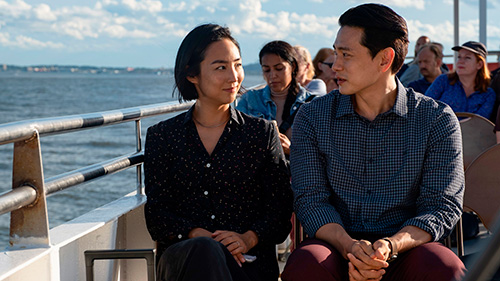
© Jon Pack
The competition included five titles (out of 19 films) from the host country Germany: Till the End of the Night by Christoph Hochhäusler, which garnered a prize for Thea Ehre for Best Supporting Performance; Afire (Roter Himmel) by Christian Petzold, which received the Grand Jury Prize (Silver Bear); Music (co-produced with France and Serbia) by Angela Schanelec, who received the Best Screenplay award; Someday We’ll Tell Each Other Everything by Emily Atef; and Ingeborg Bachmann – Journey into the Desert by veteran director Margarethe von Trotta, starring Vicky Krieps in the role of the poet. In a roundabout way, these films shared a concern with the end of life and the mental state of the protagonists.
Following from Undine and also starring Paula Beer, Petzold’s Afire shows four young people who meet in a summerhouse on the coast of the Baltic Sea. At the centre stands the aspiring writer Leon, who fails to connect to the world around him, revealing underneath his isolation and withdrawal a lack of humanism: he does not realise that his publisher suffers from terminal cancer; he fails to shed a single tear when best friend Felix and his lover Devid perish in the wildfires that ravage the island; and he mistakes Nadja for a seasonal worker, a job she does only to finance her doctoral studies. Leon’s condition makes him borderline, focused on himself to such an extent that he is unable to engage with the real world – symbolically threatened by fire, which harms, however, only those who dare live out their passion and die in embrace (Felix and Devid).
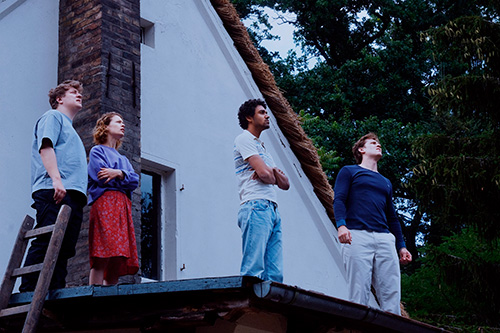
© Christian Schulz / Schramm Film
Vicky Krieps’ Ingeborg Bachmann is a celebrated poet and a fragile individual. Her love for freedom is crushed in her relationship with Max Frisch, who has a different understanding of marriage and draws on facts and not words for his literary creativity. The correspondence between Bachmann and Frisch, which has been published only recently, came too late for von Trotta’s script development. She follows Bachmann’s relationship with Frisch, the beginning of her mental breakdown, which eventually sees her in a psychiatric clinic, but also the more optimistic and refreshing period when Bachmann went on a journey into the desert with Adolf Opel to overcome her marriage breakup. Madness and insanity also underly the characters’ treatment in Angela Schanelec’s Music, which tries to adapt for the contemporary world the Oedipus story. However, he lines of transfer from the myth are not always clear – even though the film received the screenplay award.
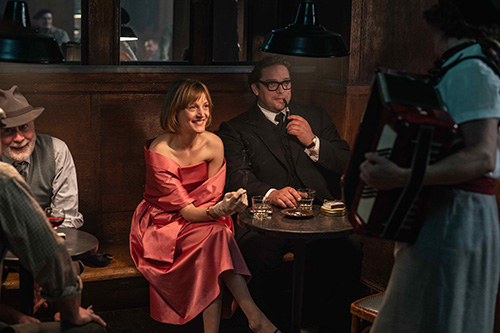
© Wolfgang Ennenbach
German-based French-Iranian Emily Atef’s amazing adaptation Someday We’ll Tell Each Other Everything is set in Thuringia just after the fall of the wall. The action unfolds against the backdrop of a farming family that split up when one of the two sons emigrated to the west, and is reunited in the first summer after reunification. More important still are the repercussions of the economic breakdown after the fall of the wall for Maria, who dates the farmers’ son Johannes, and her mother, who has lost her job. Young Maria stays over the summer with Johannes’s family and is absorbed into reading Dostoevsky’s Brothers Karamazov. One day, she meets the neighbour, Henner, some twenty years her senior, and they develop a sexual infatuation for each other. However, Henner is plagued by family traumas connected to his mother’s return after WWII: he is prone to violent outbursts, both in general and in his sexual behaviour. When he realises that Maria will choose him over Johannes, he commits suicide, like the heroine of another Russian classic, unable to live out her love in her society: Anna Karenina. Henner extracts himself from a relationship that has no future, because of the past (the violence of the war) and because of the present (the reunited Germany). Another powerful diagnosis of death and mental breakdown.
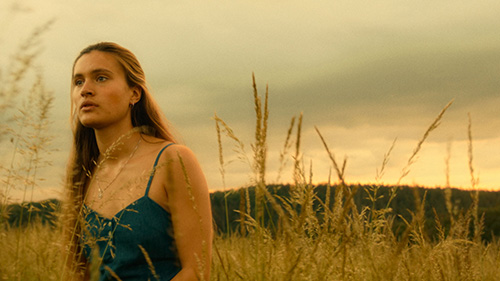
© Pandora Film / Row Pictures
French cinema was well represented in the competition, in co-productions – including the Portuguese-French Mal Viver by João Canijo that focuses on several generations of women running a hotel, which received the Jury Prize. Moreover, Philip Garrel’s Le grand chariot, starring his children Louis, Esther and Lena, garnered the Best Director award. And finally, the Berlinale Golden Bear went to Sur l’Adamant by Nicolas Philibert (in co-production with Japan).
Garrel’s film is maybe a little too much ‘old cinema’ to run in competition, but its conventionality did not stop it from winning an award. It tells the story of a breakdown of the institution ‘family’ on the example of a large family (business) of puppeteers: when the old generation passes away, it leaves a young generation struggling to make ends meet and to continue life as a family/business, especially as puppet theatre is going out of fashion. The young have no determination, abandoning wives and new-borns, and unable to sustain a relationship, leaving one of the protagonists in a psychiatric clinic at the end.
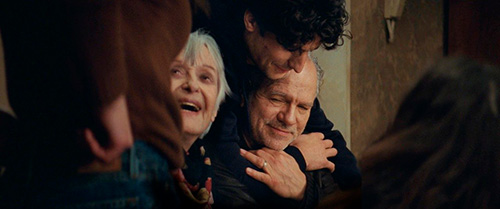
© Benjamin Baltimore; Rectangle Productions, Close Up Films, Arte France Cinéma, RTS Radio Télévision Suisse, Tournon Films
It comes as little surprise, then, in such a competition that Philibert’s Golden Bear winner is set on Adamant, a floating day-care centre on the Seine for people with mental disorders. Philibert remains a withdrawn director and narrator, handing over the story-telling to the people he observes, and letting the camera do the rest. The team in charge of the centre works towards grounding the patients in the here-and-now by engaging them in creative tasks. Focussing on the positive aspects of this work, Philibert shows a path forward and without moments of crisis in the centre. This Golden Bear underlines the power of culture, art and humanism in a competition where psychological disorders or traumas seem to affect all too many protagonists.
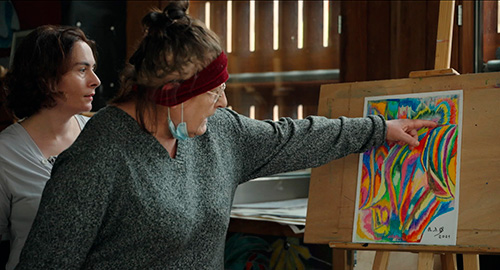
© TS Production / Longride
